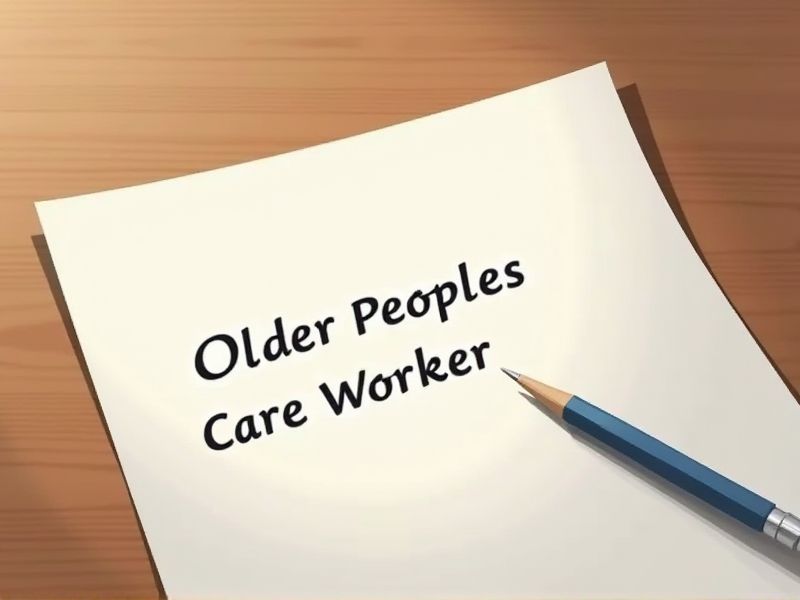
Older people's care workers handle complex healthcare and emotional needs, necessitating specialized knowledge and skills. Certifications ensure they are equipped with the necessary competencies for delivering safe and effective care. As the aging population grows, demands for highly qualified care workers increase to meet evolving challenges in elder care. Here are some important certifications you may need for Older Peoples Care Worker.
Care Certificate
The Care Certificate ensures that older peoples care workers possess foundational skills and knowledge, impacting the quality of care they provide. It standardizes training across the sector, leading to consistent care and increased trust from families. Workers with a Care Certificate are more confident in handling various scenarios, reducing potential harm or errors. Employers benefit from a well-trained workforce, which often results in improved staff retention and satisfaction.
Manual Handling Certification
Manual handling certification reduces injury risk by teaching care workers proper lifting techniques, essential for safely assisting older individuals with mobility issues. Certification ensures compliance with health and safety regulations, protecting both workers and care facilities from legal repercussions. It enhances the quality of care provided, as workers are better equipped to handle challenging physical tasks efficiently. Consistent training leads to a decreased injury rate among the workforce, promoting longer career longevity for care workers in demanding environments.
Basic Life Support (BLS) Certification
Basic Life Support (BLS) certification equips older peoples care workers with essential skills to perform CPR, which can significantly increase the chances of survival during cardiac arrest emergencies. Training in BLS ensures that care workers can promptly identify and respond to respiratory distress, reducing potential complications in elderly patients. The certification process fosters confidence in providing immediate care, which is crucial in high-stress situations where time is critical. Older peoples care workers with BLS certification are better prepared to manage choking incidents, a common risk among the elderly population, ensuring safer care environments.
Medication Administration Certification
Medication Administration Certification ensures that care workers for older adults understand proper dosage and potential drug interactions, which reduces medication errors. Inadequate knowledge can lead to adverse reactions, potentially worsening the health condition of seniors. Certified workers are better equipped to follow legal and safety guidelines, enhancing overall care quality. The certification also builds trust with families, reassuring them about the professionalism of the care provided.
Dementia Care Certification
Dementia care certification equips older peoples care workers with specialized knowledge to effectively manage dementia-related behaviors, improving the quality of life for those affected. Certified workers can recognize the early signs of dementia, leading to timely interventions and slowing disease progression. Training in communication techniques helps in reducing misunderstandings, thereby minimizing stress for both the caregiver and the patient. Certification ensures adherence to best practices, which can reduce healthcare costs through efficient resource utilization.
Infection Prevention and Control Certification
Older people's care workers frequently encounter vulnerable populations, making them a potential vector for infections if proper precautions aren't practiced. Certification in Infection Prevention and Control equips these workers with the necessary knowledge to mitigate infection risks in care settings. With an increasing aging population, healthcare facilities face growing pressure to maintain high standards of hygiene, necessitating skilled workers. Regulatory bodies often mandate such certifications to ensure compliance with public health standards, safeguarding both patients and care staff.
Mental Health First Aid Certification
Mental Health First Aid Certification equips older peoples care workers with essential skills to identify and support mental health issues, which are prevalent among the aging population. Early intervention facilitated by trained caregivers can effectively reduce the progression of mental illnesses in older adults. With certification, care workers are better prepared to create a stigma-free environment, promoting open conversations about mental health. Enhanced knowledge and techniques from the certification can lead to improved overall care quality and well-being for older individuals.
Safeguarding Adults Certification
Safeguarding Adults Certification equips care workers with the necessary skills to identify and prevent potential abuse or neglect among older adults. This training enhances the ability of workers to recognize the signs of harm, which is crucial for timely intervention. Knowledge gained from certification ensures compliance with legal and ethical standards, reducing risks of liability for care organizations. Certification fosters trust among families and care recipients, assuring them of a safe and supportive environment.
Nutrition for Older Persons Certification
Older persons often face multiple health challenges that require specialized dietary considerations. A Nutrition for Older Persons Certification equips care workers with the necessary knowledge to plan and provide appropriate meals. Certified workers are better prepared to identify nutritional deficiencies that may exacerbate age-related conditions. Enhanced nutritional care can lead to improved health outcomes and quality of life for older adults.
End of Life Care Certification
End of Life Care Certification enhances a care worker's ability to understand and address the complex needs of aging individuals during the final stages of life. The certification ensures that care workers are equipped with the latest practices and guidelines for providing compassionate and individualized support. This specialized knowledge can lead to improved patient comfort and dignity, crucial for quality of life in their remaining time. Family members gain reassurance knowing that their loved ones receive care aligned with recognized standards.
Summary
When you invest in certifications for older people's care workers, you enhance their professional competence. This increased expertise can lead to improved patient care outcomes. Certified workers tend to adhere to standardized care procedures, reducing the likelihood of errors. Furthermore, gaining certification often boosts job satisfaction and retention rates among care workers.
